How Many AI Startups Were 'Sentenced to Death' by OpenAI's Launch Event?
-
Since its inception, OpenAI has been a Sword of Damocles hanging over entrepreneurs' heads, and now that sword has finally fallen.
On November 6th Eastern Time, OpenAI held its first developer conference under the spotlight, unveiling several major updates—multimodal capabilities, price reductions, GPTs, and all tools—effectively replicating most of the startup projects from the first half of the year. This barrage of announcements left entrepreneurs utterly stunned.
"Leaving no room for third parties," "back to square one overnight," "our six-month effort now looks like a joke compared to OpenAI's updates"...
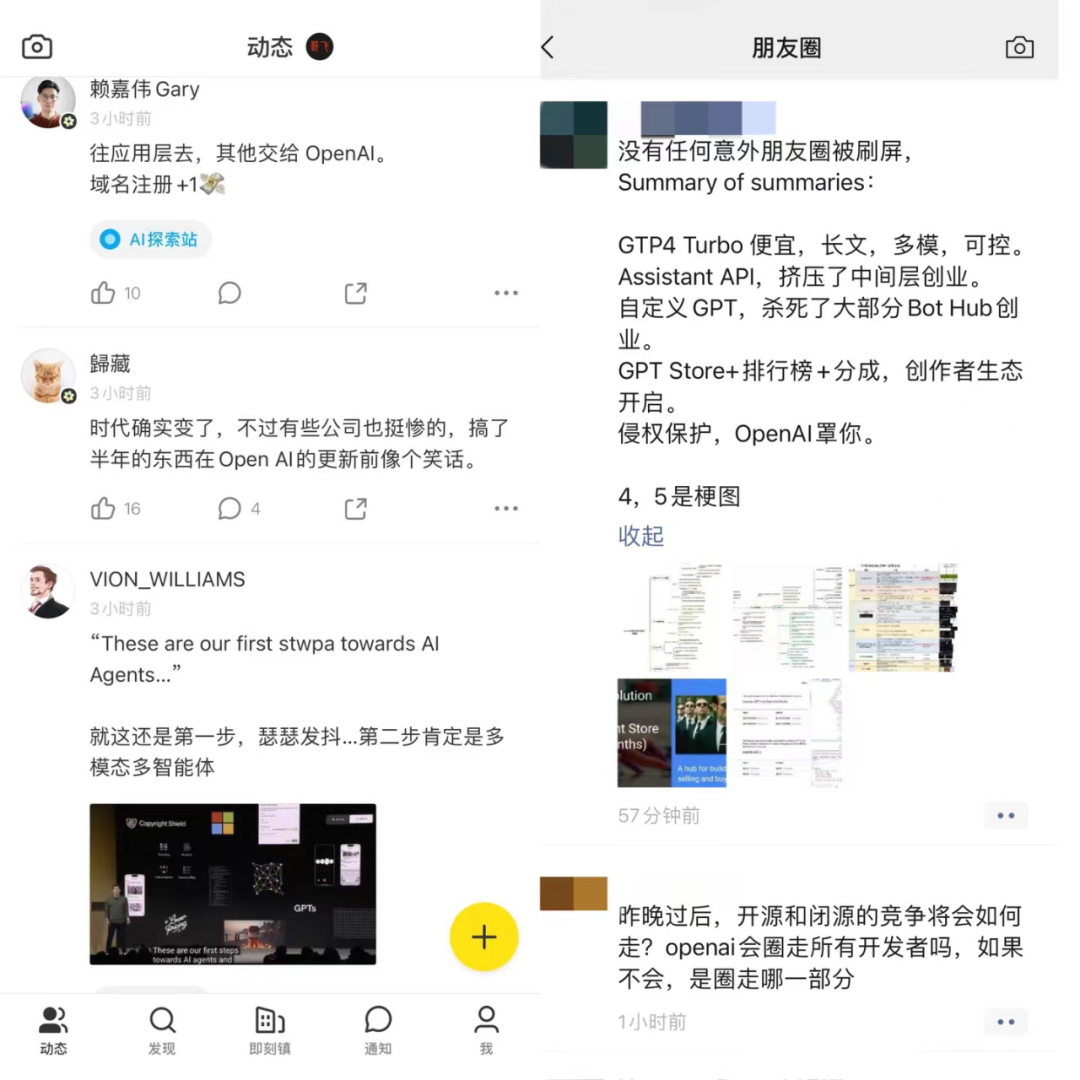
In stark contrast to the applause and cheers at the event, which resembled a Spring Festival Gala, were the sounds of countless startup projects shattering and investors' hearts breaking. On X (formerly Twitter), users spontaneously organized a real-time discussion with nearly a hundred participants. When OpenAI introduced "GPTs" and "all tools," exclamations like "Holy crap, the last six months were wasted" flooded the chat.

As the presentation progressed, every word Altman spoke chipped away at numerous startup projects. "This is a one-versus-all crushing match," someone lamented gloomily.
In fact, this wasn’t a complete surprise attack by OpenAI on entrepreneurs.
Just the day before, on November 5th, during an online event hosted by MiraclePlus exploring the new paradigm of Agents, many expressed concerns about the technology. "Tomorrow is OpenAI’s developer conference. Who knows if everything will change overnight?"
Now, those words have come true. The first thing investors did upon waking up was ask the entrepreneurs: "What’s your differentiation from OpenAI?" The entrepreneurs replied: "The difference is that we’re worse."
It’s well-known that there’s an iron rule in large model entrepreneurship: do what OpenAI doesn’t do. But now, it seems OpenAI has no boundaries. For the entire large model industry, is this a blessing or a curse?
In The Three-Body Problem, the Singer Civilization launches a dual-vector foil at the solar system, instantly reducing it to two dimensions. All life becomes a flat painting, and Earth is destroyed. This concept of 'dimensionality reduction strike' mirrors the anxiety of startups facing sudden, disruptive changes.
At yesterday's developer conference, OpenAI centered its announcements around two key areas: an all-in-one toolbox and GPT technology. The latter includes upgrades to GPT-4, as well as new developments like GPTs, Agents, and the GPT Store.
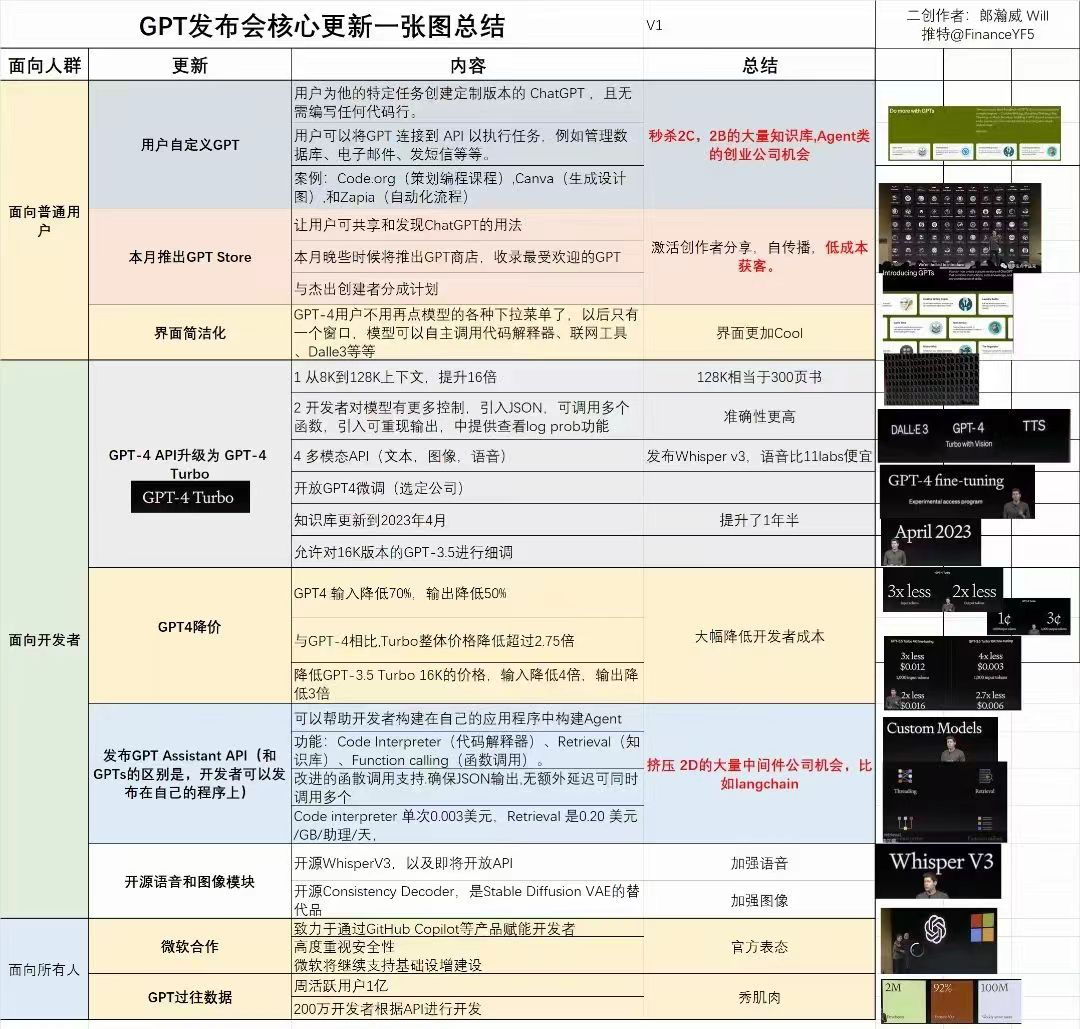
The theme of tools ran throughout the conference, covering the entire chain from large model training and inference to AI agent construction. In short: OpenAI has you covered.
In terms of foundational capabilities, GPT-4 Turbo now features a 128k context window—four times that of GPT-4—with knowledge updated to April 2023. It also integrates multimodal capabilities, including DALL-E 3 and text-to-speech (TTS) models, accessible via API.
For creating custom GPTs and building AI agents, OpenAI introduced GPT Builder, which allows developers to construct models simply by chatting with it. The upcoming Assistant API will enable AI assistants to perform specific tasks, equipped with tools like code interpreters, knowledge bases, and function calling, supporting applications such as natural language data analysis, coding assistance, and travel planning.
The first to feel the impact are companies like LongChain, which specialize in toolchains and middleware. LongChain, for example, is a framework built around large language models. It doesn’t develop models itself but simplifies application development by packaging and linking components. Its ease of use has made it a favorite among Silicon Valley VCs, securing $10 million and over $20 million in funding despite having no revenue or revenue plans.
Just as a coin has two sides, the so-called 'out-of-the-box' solutions offered by middle-layer companies like LongChain have also set the stage for OpenAI's atomic-level disruption.
Previously, some developers have shared with [Self Quadrant] that their usage of LongChain in actual development wasn't as high as expected. 'Ease of use also means less flexibility. Many startups prefer building their toolchains and frameworks from scratch to meet their specific business needs. Compared to LongChain, Hugging Face offers a plethora of open-source tools that can be freely accessed,' they said.
Now, the hype around companies like LongChain has cooled down. It seems only a matter of time before they are overtaken—if not by OpenAI, then by someone else. In contrast, China hasn't developed a complete toolchain like LongChain. Domestic startups are focusing on fragmented segments, such as data cleaning or embedding processes. The idea of 'leaving the general tasks to OpenAI while startups focus on vertical niches' has now been shattered.
What's even more alarming for these fledgling startups is that OpenAI, the insatiable lion, has set its sights on the lucrative 'AI agents' sector.
AI agents are currently one of the hottest trends in the large model space. As early as March and April this year, there was a surge in AI agent developments, with projects like Camel, BabyAGI, AutoGPT, and Stanford's West World Town emerging within just half a month.
According to [Self Quadrant], AI agents are also a focus for many domestic startups. For instance, FaceWall Intelligence recently collaborated with Tsinghua University's NLP Lab to launch XAgent, a large model 'superhero' that claims to surpass AutoGPT in handling complex real-world tasks.
However, very few AI agents have truly succeeded so far, primarily due to two reasons: the immense challenges in各个环节 like data cleaning, prompt setting, training, and output; and the prohibitively high costs, with tests often costing $5 or $3 per run, making it hard to find viable commercial applications.
'Many of you already have experience building agents, but the process is often difficult, potentially taking months and dozens of engineers, with customization being hard to control. Today, we aim to make this simpler,' Altman said during the launch event.
Clearly, OpenAI, which has already been running AI agents for various subtasks, understands the pain points of entrepreneurs all too well.
Former Tesla AI Director Karpathy, who joined OpenAI this year, stated at a developer event: 'AI agents represent a future for AI!'
At a recent MiraclePlus sharing session, experts further clarified this vision. The next step for AI agents is to enable interaction and influence between large models and the real world. Currently, humans act as intermediaries connecting large models to reality, as these models cannot yet interact or provide feedback in real environments. The future, however, will see a structure of humans-AI agents-real world, moving toward full automation and intelligence.
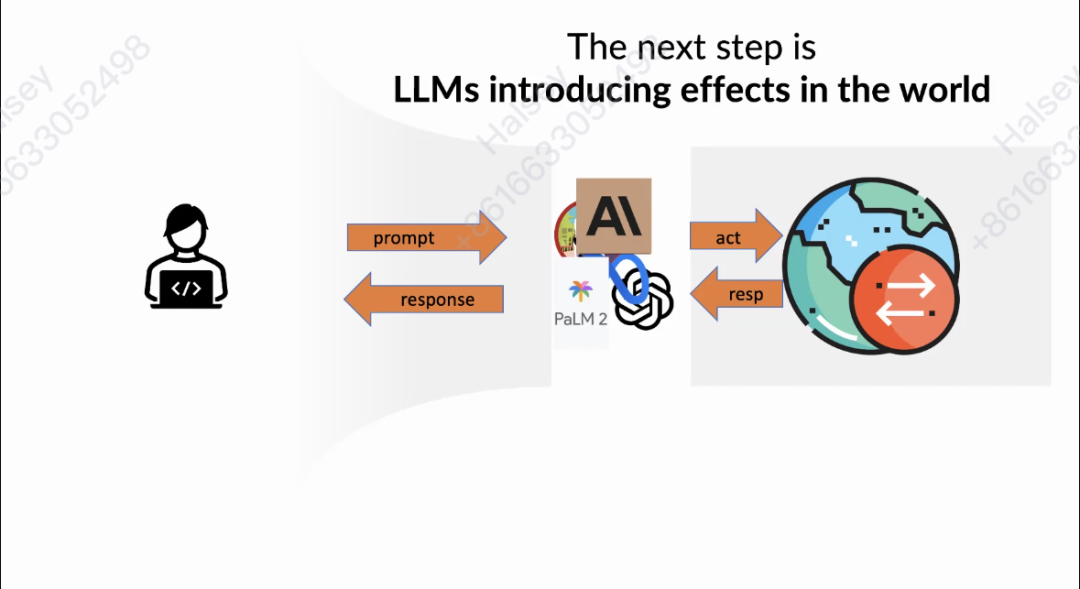
This reveals OpenAI's ambition extends far beyond a single product launch—it aims to dominate both the present and the future.
Some argue that OpenAI's open capabilities democratize AI, while others see it as monopolistic, leaving little room for competitors. To understand OpenAI's grand strategy, we must view this launch from a broader perspective.
Stepping back from the initial shock of OpenAI's updates, it becomes clear that the company has quietly assembled a trifecta: large models (foundation), toolchains (middle layer), and agents (application layer). As users and developers increasingly rely on OpenAI, the company achieves true end-to-end dominance.
Beyond the headline-grabbing 'all tools' and agents, OpenAI also upgraded GPT-4 with six major capabilities, including 128k context length, a new Assistants API, and multimodal features like computer vision. These model-layer enhancements strengthen OpenAI's market competitiveness and bring long-desired multimodal capabilities to the forefront.
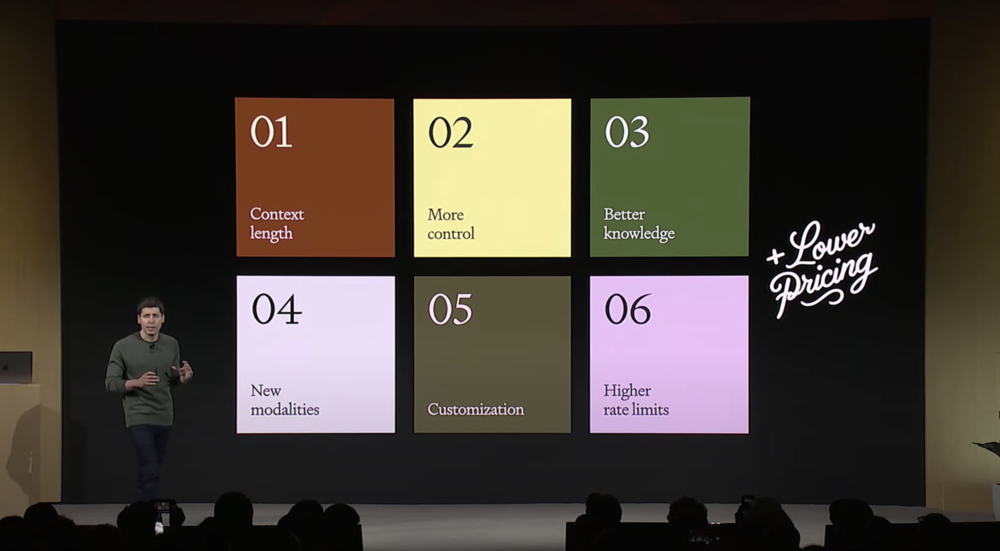
More importantly, from ChatGPT to GPT-4, OpenAI has always held the "seller's advantage," but the high price has hindered widespread adoption. Quoting Musk's words about Tesla, "No one wouldn't want GPT-4, as long as it's cheap enough." Altman has also recognized public sentiment. The upgraded GPT-4 Turbo not only significantly improves performance but also brings the price down.
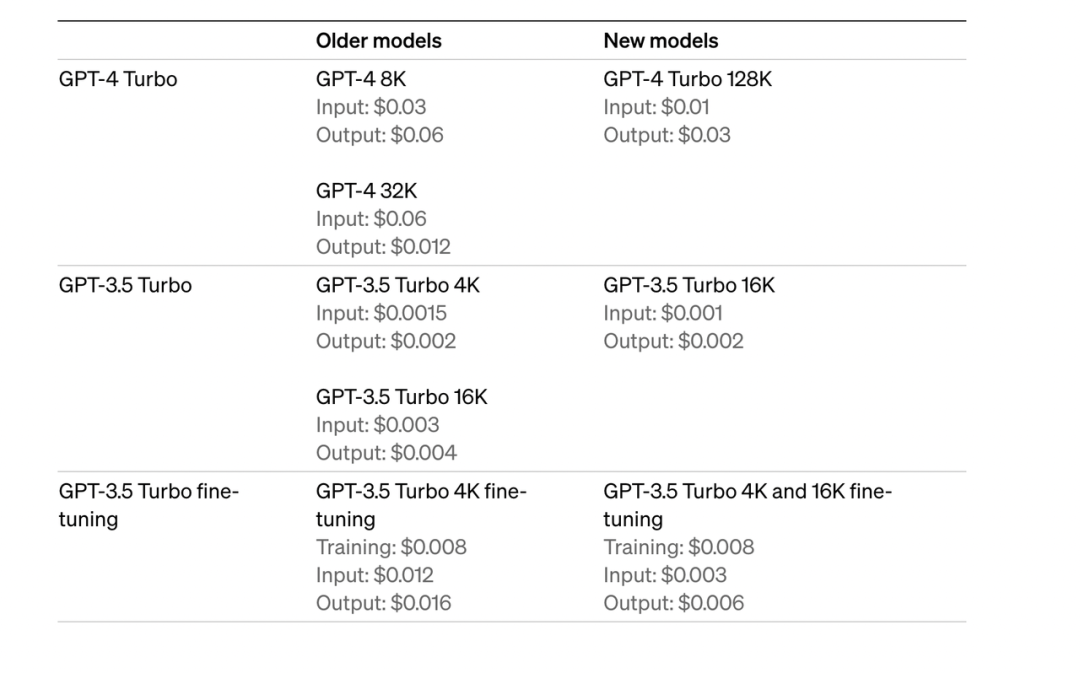
The price of GPT-4 Turbo has been reduced to 1/3 of GPT-4's input cost and 1/2 of its output cost. However, developers have noted that this price is still ten times higher than open-source large models and toolchains.
Between the absolute performance gap and the premium, businesses and developers often choose the former. On social media, some have revealed, "Leaked 'all tools' accounts are already being sold at high prices, with the same level of anticipation as Apple products in their heyday."
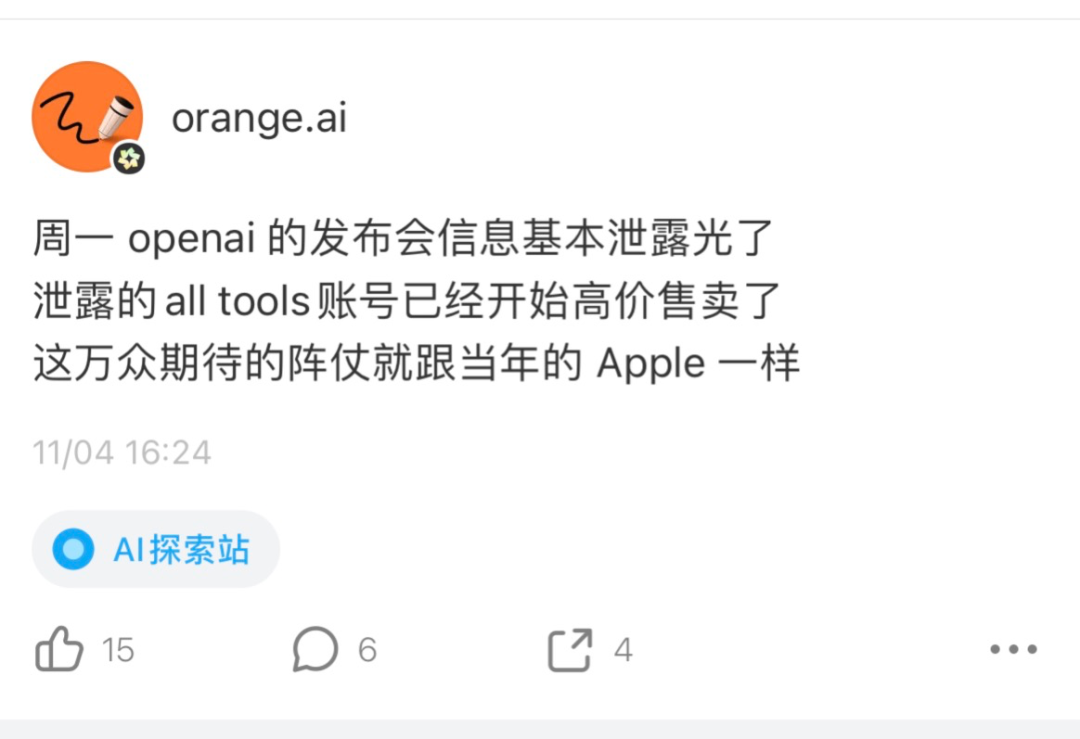
The resemblance to Apple doesn't stop at the hype. When ChatGPT plugins were launched, many compared them to Android or the App Store. Now, OpenAI has truly introduced the GPT Store.
In simple terms, developers can use OpenAI's tools to build intelligent applications—GPTs—based on GPT-4's capabilities.
OpenAI has provided a comprehensive solution covering customization, monetization, and ecosystem building:
- Development: Tools like GPT Builder and Assistants API allow even non-programmers to create customized GPT assistants and AI agents, lowering the barrier to entry.
- Monetization: OpenAI promises to share revenue with creators of the most useful and widely used GPTs.
- Ecosystem: OpenAI aims to build an Apple-like GPT Store, where developers' GPTs can be discovered by more users, featured in rankings, and gain more visibility.
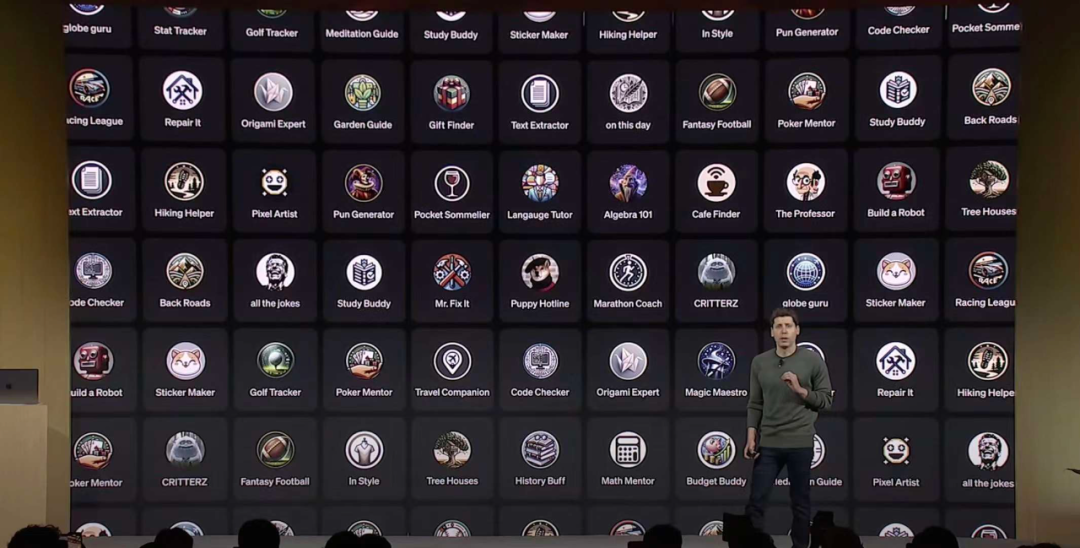
Source: YouTube Screenshot
In other words, a developer ecosystem belonging to OpenAI has truly arrived. Like the App Store, this platform will feature verified GPT creations by users, making them searchable. The store will also highlight outstanding works in categories such as productivity, education, and entertainment, with creators earning a share of revenue based on the usage of their GPT models.
From foundational large models to tools and underlying systems, OpenAI has accomplished several groundbreaking feats in a single event, reminiscent of the era of Steve Jobs.
OpenAI now stands at the pinnacle of the AI era. To draw a parallel with Apple's development: it redefined hardware (iPhone 4), software (apps), and systems (iOS, macOS), building an "indestructible" ecosystem. Apple set the rules for app design, developer guidelines, and revenue sharing. Even when smartphones began to decline, Apple's robust ecosystem kept users loyal, ensuring its dominance.
By referencing Apple's trajectory, it becomes easier to answer whether OpenAI's approach is more about democratization or monopolization.
Of course, in this new era, everything is rapidly changing.
"We eagerly anticipate the counterattacks from Meta and other open-source ecosystems. OpenAI has ignited another battle, and the next phase promises to be even more intriguing."
